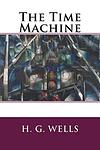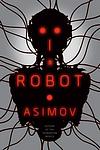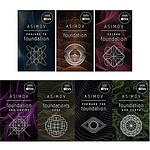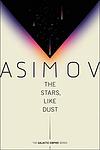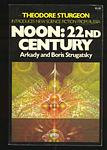The Greatest "Hard Science Fiction" Books of All Time
Click to learn how this list is calculated.
This list represents a comprehensive and trusted collection of the greatest books. Developed through a specialized algorithm, it brings together 286 'best of' book lists to form a definitive guide to the world's most acclaimed books. For those interested in how these books are chosen, additional details can be found on the rankings page.
Genres
Hard Science Fiction is a subgenre of science fiction that emphasizes scientific accuracy and technical detail. This category of books is characterized by its rigorous adherence to the known laws of physics, chemistry, and biology, often incorporating complex scientific concepts and theories as integral elements of the plot. Authors of hard science fiction meticulously research and extrapolate current scientific knowledge to explore futuristic scenarios, technologies, and space exploration with a focus on realism and plausibility. While the narratives can delve into speculative territories, they remain grounded in logical extrapolation, offering readers not only a glimpse into potential futures but also a reflection on the implications of scientific advancements on society, ethics, and the human condition.
Countries
Date Range
Reading Statistics
Click the button below to see how many of these books you've read!
Download
If you're interested in downloading this list as a CSV file for use in a spreadsheet application, you can easily do so by clicking the button below. Please note that to ensure a manageable file size and faster download, the CSV will include details for only the first 500 books.
Download-
1. The Time Machine by H. G. Wells
A Victorian-era scientist invents a machine that allows him to travel through time. He first journeys to the year 802,701 A.D., where he encounters the Eloi, a society of small, elegant, childlike adults who live in harmony but lack curiosity and drive. He later discovers the Morlocks, a nocturnal, subterranean species who prey on the Eloi. After rescuing an Eloi named Weena, the protagonist loses his time machine and must devise a plan to recover it and return to his own time, all while exploring the social and evolutionary implications of the two distinct societies.
-
2. War of the Worlds by H. G. Wells
This classic science fiction novel tells the story of a Martian invasion of Earth, as experienced by an unnamed protagonist and his brother. The Martians, who are technologically far superior to humans, cause widespread devastation with their heat-ray weapons and towering tripods. Despite humanity's best efforts to resist, they seem unstoppable. The novel is a commentary on British imperialism and explores themes of human survival and evolution.
-
3. Twenty Thousand Leagues Under the Sea by Jules Verne
This classic science fiction novel follows the adventures of Professor Aronnax, his servant Conseil, and harpooner Ned Land as they are captured by the enigmatic Captain Nemo aboard the Nautilus, a technologically advanced submarine. As they journey 20,000 leagues under the sea, they encounter a variety of sea creatures and underwater phenomena. The narrative explores themes of exploration, scientific discovery, and man's relationship with nature.
-
4. I, Robot by Isaac Asimov
The book is a collection of nine short stories that revolve around the interaction of humans and robots. The stories are tied together by a framing narrative featuring a reporter interviewing a retiring robopsychologist, Dr. Susan Calvin. The stories explore the three "Laws of Robotics" and how they are interpreted and manipulated by humans and robots. Throughout the stories, the robots often end up behaving in unexpected ways due to their interpretation of these laws, leading to thought-provoking and often ironic outcomes.
-
5. Jurassic Park by Michael Crichton
A billionaire entrepreneur, with the help of genetic scientists, creates a wildlife park on a secluded island filled with genetically engineered dinosaurs. When a small group of experts are invited to the park for a preview, things go awry as the security systems fail and the dinosaurs break free. The group must survive and escape the island while dealing with the dangerous prehistoric creatures and the moral implications of tampering with nature.
-
6. The Andromeda Strain by Michael Crichton
In "The Andromeda Strain," a team of scientists investigates a deadly extraterrestrial microorganism that has wiped out an entire town. As they race against time to understand and contain the mysterious organism, they must navigate through various obstacles, including the threat of a potential outbreak and their own internal conflicts. With a blend of science, suspense, and government secrecy, this thrilling techno-thriller keeps readers on the edge of their seats until the very end.
-
7. The Three-Body Problem by Cixin Liu
The book is a science fiction novel that intertwines the cultural revolution of China with a complex narrative involving astrophysics, virtual reality, and alien contact. It follows a disillusioned scientist who, after suffering personal tragedy during the Cultural Revolution, sends a message into space, only to receive a response from an alien civilization on the brink of destruction. As the aliens plan their migration to Earth, a secret organization works to facilitate the invasion, while a disparate group of scientists and military personnel attempt to understand and prevent the impending extraterrestrial crisis. The novel grapples with themes of human nature, technological advancement, and the vast, often incomprehensible universe.
-
8. The Martian by Andy Weir
A gripping tale of survival and resilience, this book follows the story of an astronaut left stranded on Mars by his crew who believed him dead after a fierce storm. With limited supplies, he must utilize his ingenuity, wit, and spirit to survive and signal to Earth that he is alive. The narrative is a thrilling testament to human willpower and the relentless fight for survival against all odds.
-
9. Mission Of Gravity by Hal Clement
In a fascinating and imaginative science fiction novel, "Mission of Gravity" takes readers on an extraordinary journey to the planet Mesklin. The story follows a team of explorers as they navigate the extreme gravitational pull of this peculiar world, where the inhabitants are shaped by this force. With vivid descriptions and intricate world-building, the book explores the challenges and wonders of Mesklin, offering a thrilling and thought-provoking adventure.
-
10. The Caves Of Steel by Isaac Asimov
"The Caves of Steel" is a science fiction novel set in a future where Earth is heavily populated and humans live in massive enclosed cities. The story follows a detective and his robot partner as they investigate a murder that could potentially spark a conflict between Earth's human population and the Spacers, a group of humans who live on other planets. As they delve deeper into the case, they uncover a complex conspiracy that challenges their beliefs about robots, humanity, and the future of their world.
-
11. Tau Zero by Poul Anderson
In this science fiction novel, a group of scientists and astronauts embark on a mission to explore distant galaxies. However, their ship encounters a catastrophic accident that causes it to accelerate uncontrollably, reaching speeds close to the speed of light. As they hurtle through space, the crew must grapple with the effects of time dilation, facing the prospect of spending centuries on board while only a few years pass on Earth. With limited resources and an uncertain future, they must confront their own mortality and find a way to survive in the vastness of space.
-
12. Blood Music by Greg Bear
In this thrilling science fiction novel, a brilliant scientist creates a breakthrough in genetic engineering by developing intelligent cells that can communicate and evolve. However, when the experiment goes awry, the cells begin to multiply and spread, threatening to consume all life on Earth. As chaos ensues, a group of scientists and a young girl with a unique connection to the cells must find a way to stop the impending catastrophe and save humanity.
-
13. Prelude To Foundation by Isaac Asimov
In this science fiction novel, a young mathematician arrives at the galactic empire's capital planet, hoping to present his revolutionary theory of psychohistory—a mathematical framework capable of predicting the future of large populations. While his ideas are initially met with skepticism, they soon attract the attention of the empire's political figures, who see potential for both control and upheaval. As the protagonist navigates the complex political landscape, he is pursued by various factions seeking to use his theory for their own ends. Along the way, he explores different cultures and subcultures of the sprawling empire, all while attempting to refine his nascent theory and understand the true implications of his work for the future of humanity.
-
14. The End Of Eternity by Isaac Asimov
"The End of Eternity" is a thought-provoking science fiction novel that explores the concept of time travel and its consequences. Set in a future where a secretive organization called Eternity monitors and manipulates time to prevent catastrophic events, the story follows Andrew Harlan, a "Technician" tasked with altering the past to shape a more desirable future. However, when Harlan falls in love with a woman from the past, he begins to question the morality and ethics of his actions, ultimately leading to a mind-bending revelation about the true nature of Eternity.
-
15. The Gods Themselves by Isaac Asimov
In a tale of science fiction that explores the consequences of unchecked technological advancement, the story unfolds across parallel universes, where a seemingly miraculous energy exchange between Earth and a parallel world inhabited by strange, energy-based life forms promises an endless supply of power. However, this gift comes at a potentially catastrophic cost. A physicist discovers that the exchange could lead to the destruction of both universes due to the differing physical laws governing them. The narrative weaves through the perspectives of humans and alien beings as they grapple with the moral and existential implications of their actions, ultimately questioning the very nature of progress and the ethical responsibilities of scientific discovery.
-
16. Cyteen by C. J. Cherryh
The book is a complex tale of political intrigue, identity, and psychological manipulation set in a distant future where humanity has colonized space. At the heart of the story is a brilliant young scientist who is a clone of a powerful political leader, raised to replicate her predecessor's talents and maintain her faction's dominance. As the clone grows up in a controlled environment designed to shape her into a replica of the original, she begins to question her identity and the motives of those who created her. The narrative explores themes of nature versus nurture, the ethics of cloning, and the struggle for power within the labyrinthine structures of a spacefaring civilization's government and scientific community.
-
17. The Dark Forest by Cixin Liu
In the second installment of a renowned science fiction trilogy, humanity is faced with an impending alien invasion, set to occur in four centuries. The world turns to the Wallfacer Project, a strategic initiative that appoints four individuals with the power to execute plans to combat the extraterrestrial threat, their strategies hidden even from humanity to prevent the aliens from gaining foreknowledge. One of these Wallfacers, a disillusioned astronomer, devises a complex plan involving astrophysics, sociology, and game theory, all while grappling with the philosophical implications of a universe where survival is predicated on a dark forest theory, where civilizations are hunters lying in wait, ready to strike out of fear and self-preservation.
-
18. Hyperspace by Michio Kaku
The book explores the concept of higher dimensions beyond the familiar three-dimensional space, delving into advanced theories of physics such as superstring theory and hyperspace theory. It discusses how these theoretical frameworks suggest that the universe may consist of ten or more dimensions, which could explain the fundamental forces of nature and the basic constituents of matter. The text makes complex scientific ideas accessible to a general audience, using a variety of analogies and providing historical context on the development of modern physics, ultimately suggesting that the understanding of higher dimensions could be crucial in unlocking the mysteries of the universe.
-
19. Seveneves by Neal Stephenson
In this science fiction epic, humanity faces an existential crisis when the moon suddenly explodes, triggering a catastrophic chain of environmental disasters on Earth. With only two years before the planet becomes uninhabitable, nations unite to launch a daring plan to preserve human life by sending a select group of survivors into orbit. The narrative spans thousands of years, chronicling the efforts of these initial survivors to maintain the human race in space, the political and social challenges they face, and the eventual attempt by their far-future descendants to return to a drastically changed Earth. The story is a sweeping examination of human resilience, ingenuity, and the enduring quest for survival against insurmountable odds.
-
20. Five Ages Of The Universe by Fred C. Adams, Greg Laughlin
The book explores the concept of the universe through five distinct eras, spanning from the familiar present to the farthest reaches of future time. It begins with the Primordial Era, characterized by the Big Bang and formation of fundamental particles. This is followed by the Stelliferous Era, marked by the birth and death of stars and the formation of galaxies. The Degenerate Era comes next, where stars fade away, leaving behind white dwarfs, neutron stars, and black holes. The book then delves into the Black Hole Era, where these remaining celestial objects dominate the universe. Finally, it concludes with the Dark Era, in which the universe, devoid of any substantial light sources, cools down as it heads towards entropy. Throughout, the book combines astrophysics with a philosophical perspective on the ultimate fate of the universe.
-
21. Anathem by Neal Stephenson
In a parallel world where intellectuals and scientists are cloistered in monastic communities called "concents," the story follows a young monk named Erasmas, who is drawn out of his secluded life by the discovery of an alien spacecraft orbiting his planet. As he and his companions are selected to interact with these extraterrestrial visitors, they are thrust into a complex web of political intrigue, philosophical debate, and existential risk. The narrative weaves together themes of mathematics, quantum mechanics, and multiple world theory, challenging the characters to question the nature of reality and their place within it as they strive to avert global catastrophe.
-
22. The Naked Sun by Isaac Asimov
"The Naked Sun" is a science fiction novel set in a future where humans live on different planets. The story follows a detective who is sent to investigate a murder on a remote planet called Solaria, where the inhabitants live in complete isolation and have an extreme aversion to physical contact. As he delves deeper into the case, he discovers a complex web of secrets and a society that challenges his own beliefs and understanding of human nature.
-
23. Pebble In The Sky by Isaac Asimov
In a future Earth, Joseph Schwartz, an elderly tailor from Chicago, is accidentally transported to a distant future where Earth is a radioactive wasteland. Struggling to adapt to this unfamiliar world, Schwartz becomes entangled in a political conspiracy and must navigate the complex dynamics between Earth's inhabitants and the powerful Galactic Empire. As he uncovers the truth about his own origins and the fate of humanity, Schwartz becomes a key player in determining the future of the galaxy.
-
24. The Stars, Like Dust by Isaac Asimov
In a future where Earth is ruled by a tyrannical empire, Biron Farrill, a young student, finds himself caught in a web of political intrigue and rebellion. After his father is killed, Biron embarks on a journey to uncover the truth about his father's death and the secrets hidden within the stars. With the help of a resourceful woman named Artemisia, Biron must navigate a dangerous universe filled with spies, assassins, and hidden agendas. As he unravels the mysteries of his father's past, Biron becomes entangled in a plot that could change the course of history and determine the fate of humanity.
-
25. Noon, 22nd Century by Arkady Strugatsky
This book presents a collection of interconnected stories set in the 22nd century, a time when humanity has made significant advances in technology, society, and ethics. The narrative explores various facets of this utopian future, from space exploration and colonization of other planets to the profound changes in human relationships, work, and leisure. Through the eyes of its diverse characters, the book delves into the complexities and nuances of a world where humanity strives to balance technological progress with ecological sustainability and social harmony, offering a hopeful yet reflective vision of the future.
Reading Statistics
Click the button below to see how many of these books you've read!
Download
If you're interested in downloading this list as a CSV file for use in a spreadsheet application, you can easily do so by clicking the button below. Please note that to ensure a manageable file size and faster download, the CSV will include details for only the first 500 books.
Download